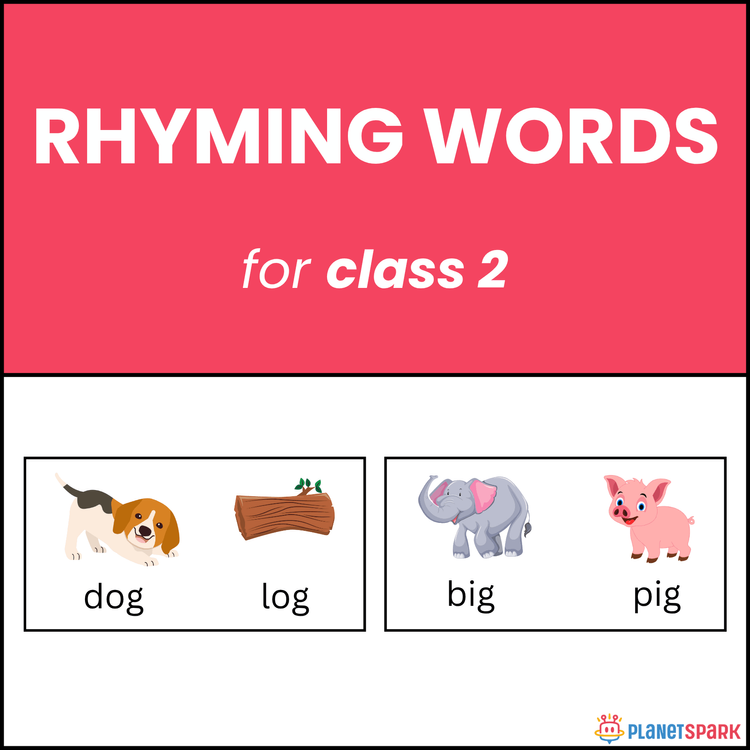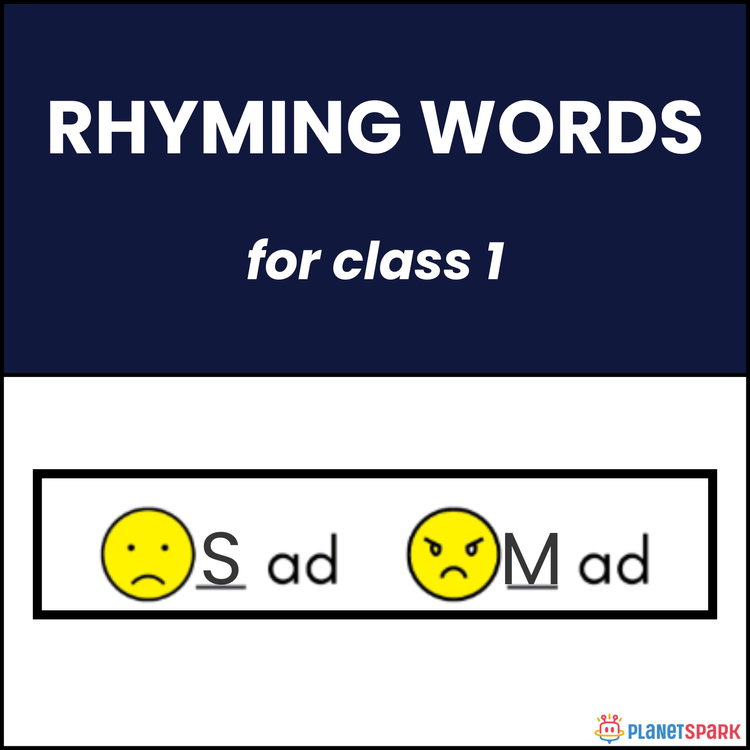English Rhyming Words List & Examples - Easy for Kids
Last Updated At: 2 Dec 2025
7 min read
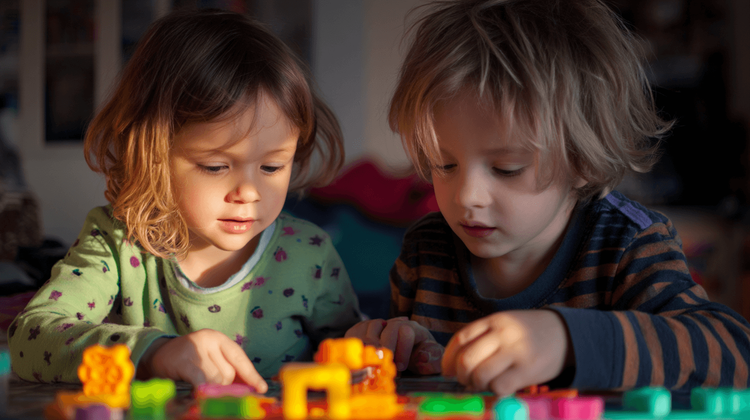
Table of Contents
- What Are Rhyming Words?
- English 50 Rhyming Words List for Kids
- Rhyming Words for Kids: Fun Ways to Learn
- Importance of Rhyming Words in English for Kids
- Rhyming Words Worksheets for Kids
- Why Choose PlanetSpark for Learning Rhyming Words?
- Bonus: Rhyme-Based Learning Activities You Can Try at Home
- Conclusion
- FAQs on Rhyming Words for Kids
Willing to improve your child's verbal skills by through enhancing pronunciation and vocabulary? This blog has over 50 rhyming words list in english along with engaging activities to introduce rhyming words for kids.
At PlanetSpark, learning gets exciting with our Spoken English Course where phonics, vocabulary, and real-life speaking come alive through fun games, stories, and expert-led sessions.
What Are Rhyming Words?
Rhyming words are words that have the same or similar ending sounds. For example:
Cat – Hat
Sun – Fun
Car – Star
These words help children recognize phonetic patterns and improve their pronunciation and fluency in English speaking.
English 50 Rhyming Words List for Kids
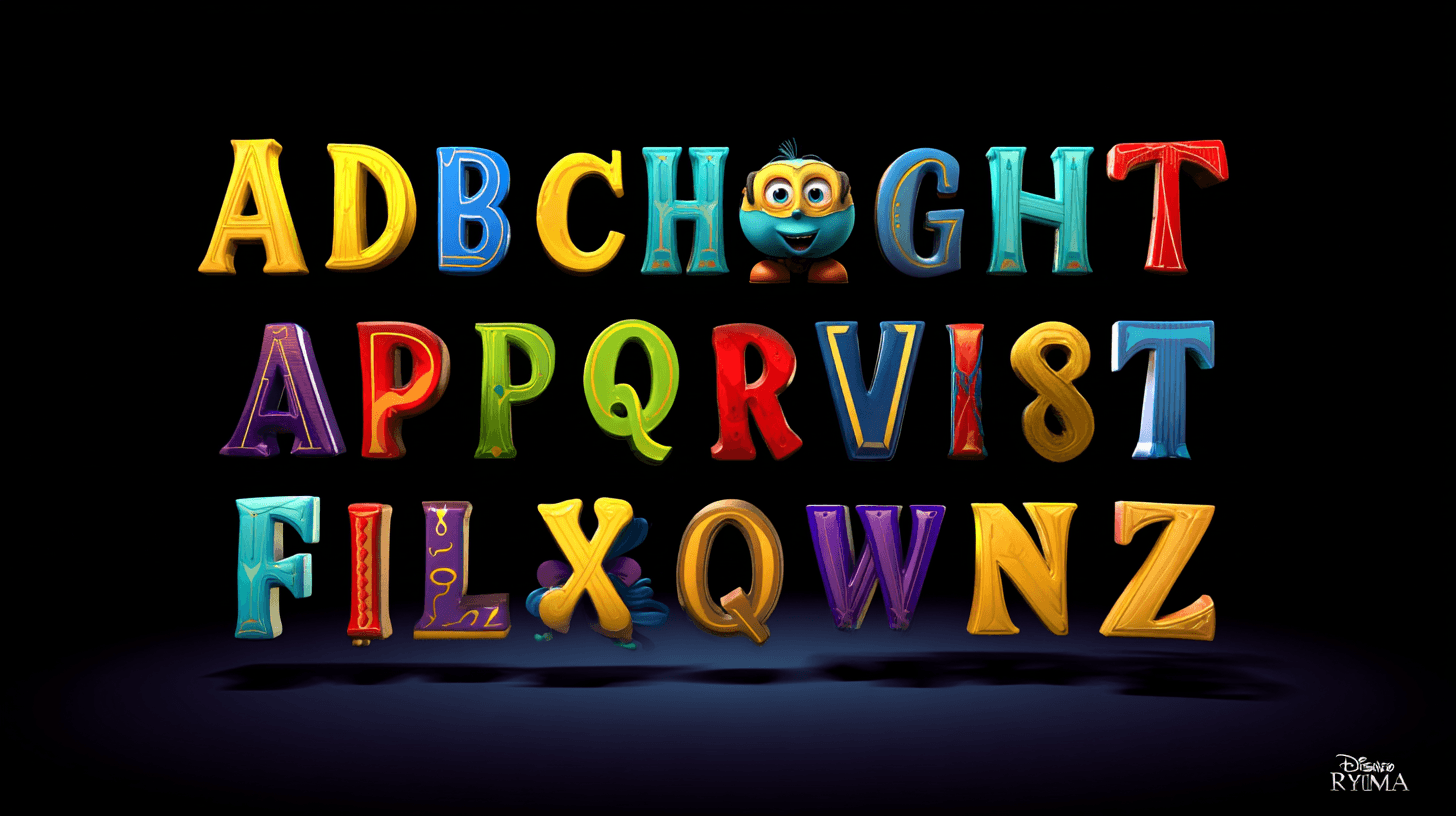
Here’s an English 50 rhyming words list for easy reference:
Single-Syllable English 50 Rhyming Words List
These are simple, easy-to-pronounce rhymes perfect for beginners and Class 1 students:
Word | Rhyming Words |
| Cat | Bat, Hat, Mat, Rat, Fat |
| Dog | Log, Fog, Bog, Hog, Jog |
| Sun | Fun, Run, Bun, Gun, Done |
| Ball | Call, Tall, Fall, Hall, Mall |
| Bed | Red, Fed, Led, Said, Shed |
| Pen | Ten, Den, Men, Hen, When |
| Box | Fox, Locks, Rocks, Socks, Talks |
| Star | Bar, Car, Far, Jar, Scar |
| Bell | Well, Sell, Fell, Tell, Shell |
| Pig | Big, Dig, Fig, Rig, Wig |
Turn Rhymes into Real Conversations!
Join PlanetSpark’s Spoken English Course and help your child master rhyming, pronunciation, and confident speaking.
Two-Syllable English 50 Rhyming Words List
These words are slightly more advanced and help build rhythm and fluency:
Word | Rhyming Words |
| Apple | Chapel, Snapple |
| Tiger | Spider, Rider |
| Happy | Nappy, Snappy |
| Bunny | Funny, Sunny |
| Candy | Sandy, Handy |
| Table | Stable, Fable |
| Bubble | Double, Trouble |
| Rocket | Pocket, Locket |
| Pillow | Willow, Yellow |
| Flower | Tower, Power |
Rhyming Words with Different Spellings
These pairs sound the same but are spelled differently a fun and challenging way to boost phonics awareness and spoken English clarity.
Word | Rhyming Word (Different Spelling) |
| Blue | Blew |
| Hear | Here |
| Night | Knight |
| Sun | Son |
| Break | Brake |
| Write | Right |
| Plain | Plane |
| Read | Reed |
| Pair | Pear |
| Meat | Meet |
Rhyming Words for Kids: Fun Ways to Learn
Learning rhymes doesn't have to be boring. Here are some engaging activities to introduce rhyming words for class 1 and other early learners.
- Rhyming Stories and Poems: This helps kids identify and remember rhymes like “star” and “are.” Use fun poems like:
"Twinkle, twinkle little star,
How I wonder what you are..."
- Rhyming Songs and Chants: Songs like “Old MacDonald” and “Baa Baa Black Sheep” introduce rhyming in a natural and musical way.
- Rhyming Word Matching Games: Create flashcards or rhyming puzzles to help match words like “log – frog” or “cake – snake.”
- Rhyming Words Worksheets: Use rhyming words worksheets that involve circling the correct rhyming pair, filling in missing rhymes, or coloring rhyming objects.
- Rhyming Dice or Spinners: Make rhyming more interactive with dice games or rhyming wheels with different ending sounds.
Importance of Rhyming Words in English for Kids
Learning rhyming words in English helps kids in multiple ways:
1. Enhances Phonemic Awareness
Rhyming helps children recognize and work with the individual sounds in spoken words, which is called phonemic awareness. When kids identify rhyming pairs like cat–hat or sun–fun, they begin to understand how words can share similar sound endings. This awareness is foundational for developing reading skills, as it trains the brain to detect patterns and sound relationships that form the basis of decoding and spelling words.
2. Boosts Vocabulary
By learning rhyming sets, children naturally build vocabulary. If a child knows the word cake, and then hears bake, lake, and snake in a rhyme, they are more likely to understand and remember these new words due to the familiar sound structure. Rhymes offer a contextual and repetitive way to introduce new vocabulary, which helps children internalize meanings and usage effortlessly.
3. Improves Listening Skills
Rhyming activities require careful listening to hear how words sound alike or differ slightly. This hones children’s auditory discrimination skills essential for understanding speech and instructions. As children listen to rhymes, they practice differentiating vowel and consonant sounds, picking up on rhythm and stress, which ultimately improves their pronunciation and fluency.
4. Makes Learning Fun
Rhymes bring joy into learning through their playful rhythm and sound. Rhyming songs, poems, chants, and nursery rhymes are easy to sing along with, remember, and repeat. This engaging repetition encourages children to participate, making language learning an enjoyable and stress-free experience. Fun learning also leads to better retention, which is crucial at an early age.
Rhyming Words Worksheets for Kids
Rhyming worksheets are fantastic resources for parents and educators. They often include:
Match the rhyme (e.g., sun – bun)
Fill in the blank (e.g., The dog sat on a ___)
Rhyming word maze
Circle the rhyming pair
Find and color the rhyming word
These worksheets are perfect for rhyming words for class 1 learners who are just beginning to understand phonics and sound play.
Sample Rhyming Exercise
Fill in the Blanks with a Rhyming Word:
The dog jumped over the ___ (log)
I saw a cat wearing a ___ (hat)
She went for a run, it was so much ___ (fun)
The frog sat on a ___ (log)
He made a wish on a shining ___ (star)
Try More: Use PlanetSpark’s rhyming words worksheet packs for more engaging activities!
Why Choose PlanetSpark for Learning Rhyming Words?
At PlanetSpark, we understand that teaching rhyming words for kids isn’t just about memorizing pairs it’s about bringing language to life. Here's how our spoken English program enhances rhyming word learning:
Live, Interactive English Conversations: Through live role-play, rhyming games, and storytelling, kids practice rhyming in context. For example, they might describe a rhyming scene like "A fat cat sat on a mat with a hat!"
Accent Clarity & Phonetic Training: Children learn correct sound pronunciation while playing with rhymes, helping them speak clearly and confidently.
Creative Writing + Speaking Integration: Children write and present rhyming poems, creating a strong link between reading, writing, and speaking skills.
Imagery and Poetic Devices: Just like in the curriculum image you shared, children also learn to identify imagery in poetry, making them more imaginative speakers and writers.
AI-Powered Feedback: Instant feedback on pronunciation, fluency, and expression ensures that kids are not just saying the words but saying them right!
Bonus: Rhyme-Based Learning Activities You Can Try at Home
Rhyme & Match Game – Print two sets of words and match rhyming pairs
Poetry Night – Let kids perform rhymes for the family
Create-a-Rhyme Challenge – Give them a word and a timer
Rhyme Hunt – Read a book and pick out every rhyme you hear
Word Family Wall Chart – Update it with new rhyming families weekly
Combine these with PlanetSpark’s worksheets and lesson plans for the best results!
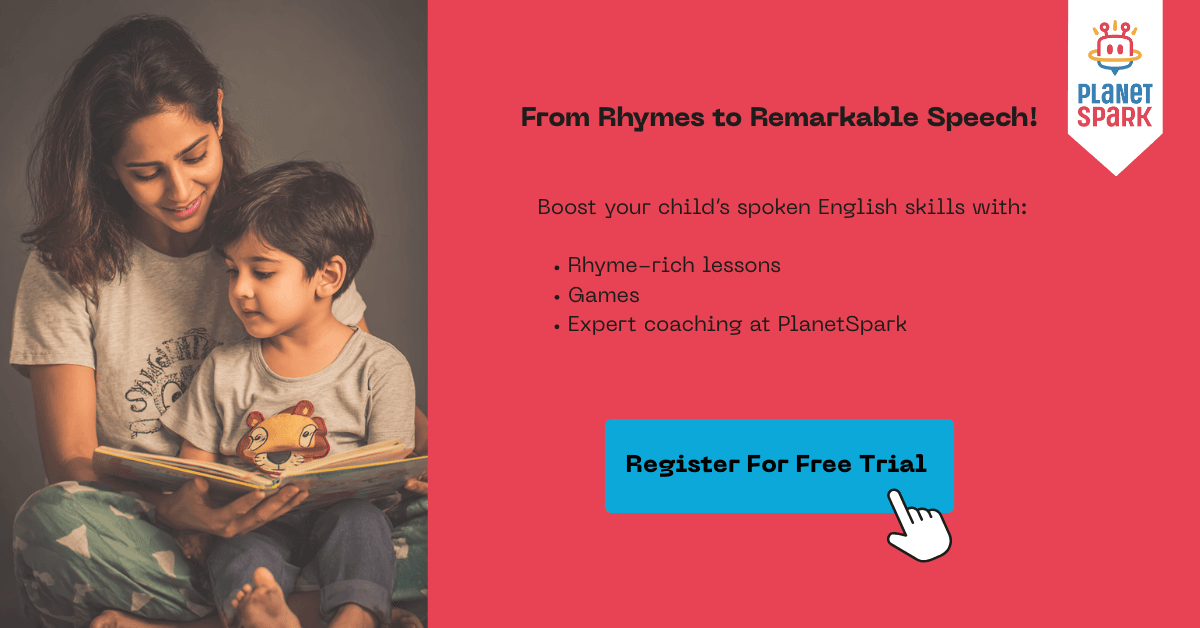
Conclusion
Rhyming is the first step into a world of creativity, language rhythm, and joyful communication. Whether you’re a parent, teacher, or educator, helping children master rhyming words for kids will set them on the path to becoming fluent readers and confident speakers.
And with PlanetSpark’s spoken English program, your child won’t just learn rhymes they’ll live them through poetry, public speaking, and powerful conversations.
FAQs on Rhyming Words for Kids
Q. What are rhyming words?
A. Rhyming words are words that have similar ending sounds. For example, "cat" and "hat" rhyme because they sound alike at the end.
Q. Why are rhyming words important for children?
A. Rhyming helps children develop phonemic awareness, improves vocabulary, and supports memory retention. It also enhances their reading and speaking skills.
Q. Where can I find rhyming words worksheets?
A. You can download free rhyming words worksheets online or get access to customized rhyme-based lessons through PlanetSpark’s Spoken English courses.
Q. How many rhyming words should a child know?
A. A child in early grades (like class 1) should be able to recognize and generate simple rhymes with at least 30–50 common rhyming word pairs.
Download Free Worksheets
Personalized Communication Report
Record a video to get a AI generated personalized communication report for your child
Select Learner's Class

Hi There, want to try these
tips for your child with
LIVE with our expert coach?
Let's check your child's
English fluency

